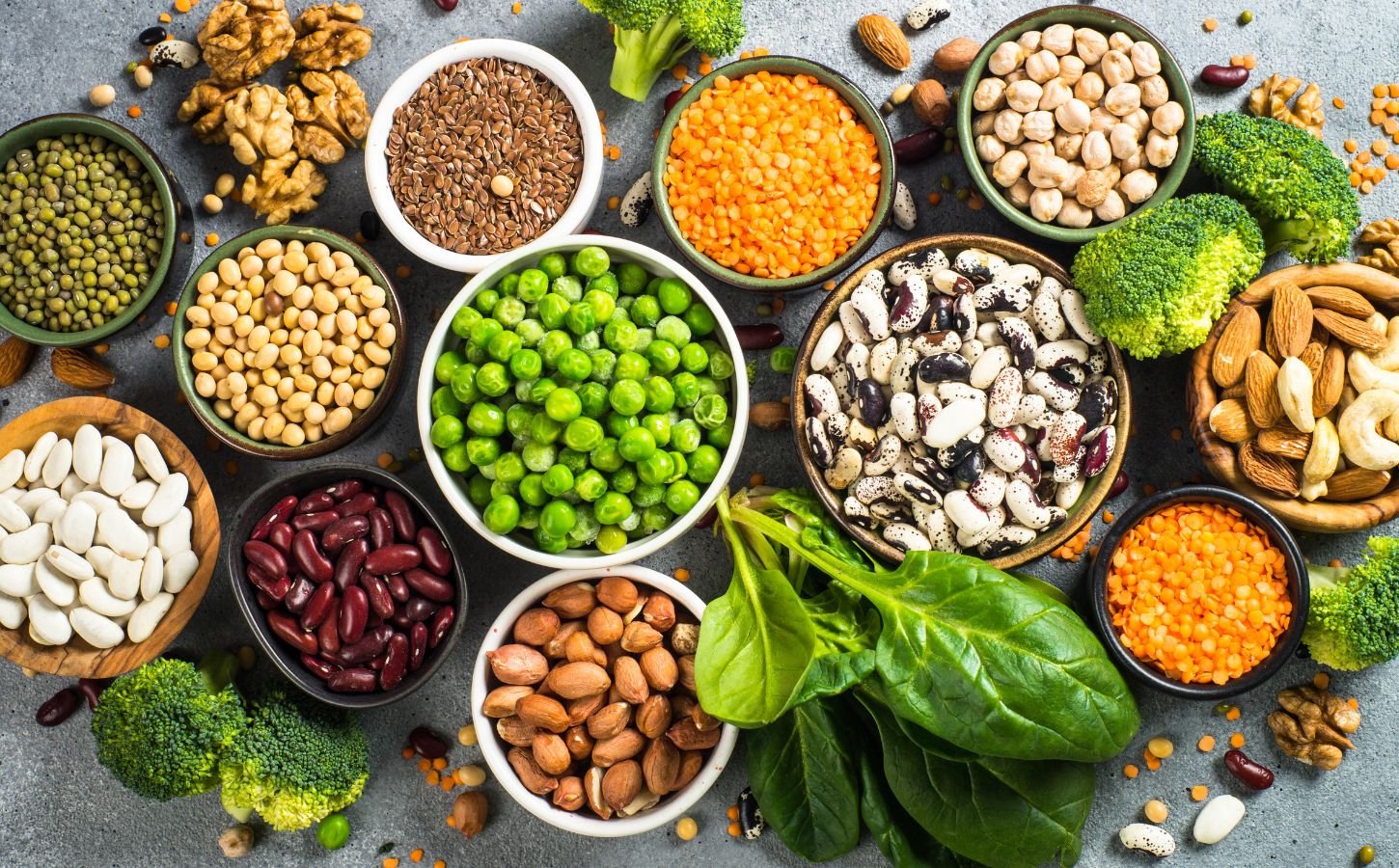The Top 5 BBQ Sauces Every Plant-Based Chef Should Stock
The Top 5 BBQ Sauces Every Plant-Based Chef Should Stock
Blog Article
All Regarding Healthy Food: Benefits of Enjoying Plant Based Alternatives
The discussion bordering plant-based diets has gotten substantial attention in the last few years. Numerous individuals are discovering the potential health and wellness benefits, dietary advantages, and ecological effects connected with these dietary selections. As individuals end up being more mindful of their food's impact on wellness and sustainability, concerns develop concerning the functionalities of embracing such a way of life. What specific modifications can one anticipate, and how might these options reshape not only personal health and wellness however likewise the earth's future?
Comprehending Plant-Based Diet Plans
Although several people link plant-based diets generally with vegetarianism or veganism, these diets can encompass a variety of consuming patterns that focus on entire, minimally refined plant foods. Such diets frequently consist of fruits, veggies, whole grains, beans, seeds, and nuts, while limiting or removing pet products. This adaptability permits people to tailor their nutritional options according to nutritional needs and personal preferences. Some may embrace a mainly plant-based diet regimen while still periodically consuming meat or dairy products, usually referred to as a flexitarian technique. The emphasis remains on incorporating more plant foods, which can lead to a varied range of tastes and dishes. Comprehending these different analyses of plant-based consuming is important for valuing its availability and appeal in contemporary food culture.
Wellness Perks of Plant-Based Foods
The wellness advantages of plant-based foods are considerable, offering a nutrient density benefit that supports general health. Research study shows that these foods can improve heart health and play an important function in effective weight monitoring. By incorporating extra plant-based alternatives, people may enhance their dietary choices and advertise lasting health and wellness.
Nutrient Thickness Advantage
Nutrient density plays an important function in the health advantages of plant-based foods, making them an engaging option for those seeking a balanced diet plan. Plant-based foods, such as fruits, veggies, beans, nuts, and entire grains, are usually rich in necessary vitamins, minerals, and antioxidants while being lower in calories. This high nutrient density permits individuals to consume less calories while still satisfying their dietary demands. In addition, these foods are loaded with dietary fiber, advertising gastrointestinal health and wellness and aiding in weight management. By including nutrient-dense plant-based choices, customers can improve their overall health, sustain their immune systems, and minimize the threat of chronic illness. Inevitably, the nutrient density of plant-based foods underscores their importance in a health-conscious way of life.
Heart Wellness Enhancement

Weight Management Support
Along with promoting heart wellness, a plant-based diet can significantly aid in weight administration. This dietary method highlights whole foods such as fruits, veggies, legumes, nuts, and whole grains, which are usually lower in calories and greater in fiber contrasted to animal-based items. The high fiber web content aids boost satiation, minimizing overall calorie intake. In addition, plant-based diet plans are often rich in vital nutrients while low in harmful fats, making it simpler to keep a healthy weight. Plant Based Beef. Study indicates that people who adopt a plant-based way of life have a tendency to have lower body mass indexes (BMIs) and experience even more successful fat burning compared to those that consume meat-heavy diets. Welcoming plant-based choices is a calculated option for reliable weight administration.
Nutritional Value of Plant-Based Components
Plant-based ingredients are rich in necessary nutrients, using a varied range of vitamins, minerals, and antioxidants that add to total wellness. A contrast of protein sources reveals that while pet products are usually deemed premium, many plant-based choices give appropriate protein and various other valuable substances. Comprehending the dietary value of these active ingredients can aid people make educated dietary options.
Crucial Nutrients in Plants
Nutrient-rich ingredients discovered in plants provide a diverse selection of essential minerals and vitamins that add significantly to general health and wellness. These active ingredients are rich in vitamins A, C, and K, which support immune feature, vision, and blood clotting, respectively. In addition, plants provide crucial minerals such as magnesium, calcium, and potassium, crucial for heart health and wellness, muscle feature, and bone strength. The visibility of fiber in plant-based foods aids food digestion and advertises a healthy and balanced digestive tract microbiome. Antioxidants, discovered generously in veggies and fruits, help combat oxidative stress and anxiety and lower inflammation. Several plant foods are reduced in calories yet high in nutrients, making them an outstanding option for those looking for to preserve a healthy weight while guaranteeing excellent nutrient consumption.

Comparing Protein Resources
Healthy protein resources differ considerably in their nutritional profiles, with plant-based active ingredients supplying one-of-a-kind benefits. Unlike pet proteins, which often contain saturated fats and cholesterol, plant healthy proteins often tend to be reduced in these unhealthy elements. Legumes, nuts, seeds, and whole grains are abundant in vital amino acids, fiber, vitamins, and minerals. For instance, lentils give high protein content along with considerable iron and folate, while quinoa is a complete healthy protein, providing all nine crucial amino acids. Additionally, plant-based proteins are usually gone along with by antioxidants and phytochemicals that sustain overall health. The change to plant-based healthy protein sources not just improves dietary intake but likewise straightens with sustainable dietary techniques, reducing ecological effect and advertising long-lasting wellness benefits.
Environmental Influence of Plant-Based Consuming
As recognition of climate modification grows, many people are discovering lasting nutritional options that can significantly decrease their ecological impact. Plant-based consuming has actually arised as a substantial contributor to lowering greenhouse gas emissions, which are mainly associated with animals production. The growing of fruits, vegetables, veggies, and grains usually needs less resources, such as water and land, contrasted to animal farming. Additionally, plant-based diet plans can result in decreased deforestation, as less land is needed for grazing animals or expanding animal feed. By moving in the direction of plant-based options, consumers can sustain biodiversity and advertise healthier ecological communities. In general, welcoming plant-based eating not only benefits individual health however likewise stands for a vital action towards environmental sustainability and conservation efforts.
Conquering Common Misconceptions
While several people acknowledge the benefits of a plant-based diet, numerous misunderstandings often prevent them from completely welcoming this lifestyle. A common belief is that plant-based diet plans do not have adequate protein; nonetheless, numerous plant resources, such as legumes, nuts, and tofu, offer sufficient protein. Furthermore, some think that this diet plan is costly, when actually, staples like beans, rice, and seasonal vegetables can be quite inexpensive. An additional false impression is that plant-based eating is extremely restrictive, whereas it really provides a diverse range of foods and tastes. Lastly, lots of fret that a plant-based diet regimen may result in deficiencies, yet with here correct planning, individuals can acquire all essential nutrients, including nutrients, while taking pleasure in a large range of tasty dishes.
Tips for Transitioning to a Plant-Based Way of life
Making the shift to a plant-based way of life can be an enhancing experience, though it usually needs some assistance to navigate the initial modifications. Individuals are urged to start gradually, incorporating even more fruits, vegetables, beans, and whole grains into their meals while lowering meat and milk intake. Dish preparation is crucial; preparing a regular menu can aid reduce visit our website the change and stop final unhealthy options. Checking out cooking approaches and brand-new recipes can also improve the experience and maintain enjoyment regarding plant-based eating. Furthermore, joining support system or neighborhoods can supply inspiration and share valuable ideas. Lastly, staying notified concerning nourishment warranties well balanced meals, protecting against deficiencies while cultivating a healthy and balanced, enjoyable plant-based way of life.
Delicious Plant-Based Meal Concepts
Checking out tasty plant-based dish concepts can motivate people to accept an extra nourishing diet regimen. One prominent alternative is a passionate quinoa salad, featuring cherry tomatoes, cucumber, and a zesty lemon-tahini dressing. An additional fave is a tasty lentil stew, loaded with carrots, celery, and great smelling natural herbs, excellent for a soothing dinner. For breakfast, overnight oats made with almond milk, chia seeds, and covered with fresh berries provide a healthy begin to the day. Furthermore, a vibrant vegetable stir-fry with tofu and a selection of vibrant veggies can be a quick yet satisfying meal. Velvety avocado salute on whole-grain bread, sprinkled with flavors and seeds, supplies a basic yet savory treat. These meals display the variety and splendor of plant-based eating.

Frequently Asked Concerns
Can a Plant-Based Diet Regimen Provide Sufficient Healthy Protein?
The inquiry of whether a plant-based diet plan can give enough healthy protein prevails. Many sources, consisting of vegetables, nuts, seeds, and entire grains, can meet healthy protein requires efficiently, supporting a healthy and balanced diet regimen for individuals.
Are Plant-Based Diet Plans Ideal for Kid?
The viability of plant-based diet regimens for kids relies on careful preparation. Adequate nutrients must be ensured, consisting of vitamins, minerals, and proteins. With proper assistance, such diet regimens can sustain healthy and balanced development and growth in children.
Just how Do I Dine Out on a Plant-Based Diet?
Eating in restaurants on a plant-based diet regimen involves seeking dining establishments with diverse food selections, requesting alterations, and discovering vegan-friendly options. get more Preparation ahead and interacting nutritional choices can boost the eating experience while preserving dietary options.
What Are Usual Allergens in Plant-Based Foods?
Common allergens in plant-based foods include soy, gluten, nuts, and seeds - Plant Based Chicken. People adhering to a plant-based diet regimen needs to understand these irritants and review labels meticulously to stay clear of adverse responses and assure risk-free usage
Can Plant-Based Diets Assist With Fat Burning?
Research indicates that taking on a plant-based diet might promote fat burning due to its typically lower calorie thickness and higher fiber web content. This combination can boost satiation, aiding people handle their caloric consumption successfully. Many people associate plant-based diet regimens mainly with vegetarianism or veganism, these diet plans can encompass a large array of consuming patterns that prioritize entire, minimally processed plant foods. Nutrient thickness plays an important duty in the health and wellness advantages of plant-based foods, making them an engaging choice for those seeking a balanced diet regimen. Plant-based diets have been shown to considerably enhance heart health, as they commonly have aspects that sustain cardio feature. In addition to promoting heart health and wellness, a plant-based diet plan can significantly aid in weight monitoring. A typical idea is that plant-based diet plans lack adequate protein; nonetheless, various plant sources, such as vegetables, nuts, and tofu, provide adequate protein.
Report this page